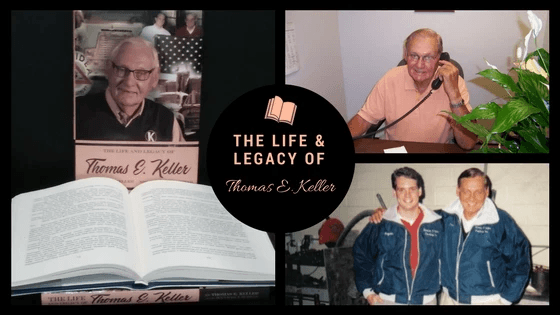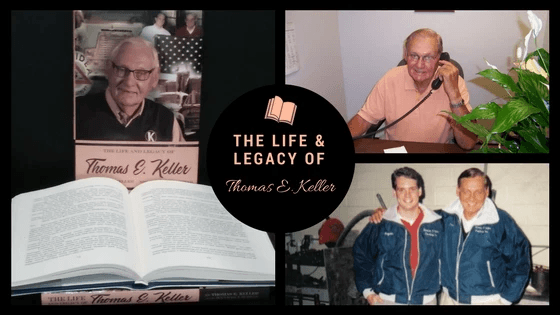


2018 marks the 40th anniversary of the incorporation of Thomas E. Keller Trucking. Tom’s humble beginnings taught him the value of family, hard work, and building a legacy as told in his memoir, The Life and Legacy of Thomas E. Keller.
Thomas E. Keller Trucking was growing rapidly throughout the 1980s, and I couldn’t be happier. I was putting in a lot of hours, often working seven days a week. My wife, Suzette, and my son, Mark, were very supportive.
Mark was so intelligent. Boy, were we proud of Mark’s accomplishments as he grew up. From a young age, he excelled in his academics and was always recognized by teachers as being the smartest in his classes. Mark kept earning high marks in school, and when he graduated high school, he was named valedictorian. Mark went on to enroll at the University of Dayton, majoring in Pre-Law. He completed his studies and graduated third in his class in 1986. Subsequently, he was accepted into law school in Toledo.
During his freshman year, he was living in the dormitory and studying for his courses. Six weeks into his semester, Suzette and I received a call from someone at the university. “You need to come down to see Mark. He appears to be in some kind of stupor,” we were told.
This scared us to death. We had never seen Mark in this state of mind, and we had no idea what condition we’d find him in when we arrived. Suzette and I made the drive to the university, and we found him exactly as the university described him – disoriented, confused, and incoherent. He didn’t even recognize us. We packed up a few of Mark’s belongings, and we headed to St. Vincent’s. St. Vincent’s had a floor devoted to mental illness, and we got Mark set up with a room and an evaluation.
We spoke with a psychiatrist who prescribed Mark with a few different medicines. After about three or four days, we could see Mark was not improving. “How about you just let us take him home?” we asked.
That’s what we did. We still didn’t have a doctor, a diagnosis or a treatment plan – and Mark was clearly in need of help. While he was home, we immediately began working with a Toledo psychiatrist and moving toward a diagnosis. Well, right in the middle of the diagnosis process, this psychiatrist let us know she was being transferred to Atlanta, Georgia. This was particularly frustrating because at that point, we felt we were close to getting some answers. We were transferred to another psychiatrist and started the process all over again.
All we could do while we were waiting was have Mark home with us, keep an eye on him, and hope for a diagnosis and medicine that would bring him back to reality soon. This went on for years as we searched for answers.
Then, the unthinkable happened.
It was an ordinary Monday morning on August 13, 1990, and I had gotten into the office early like I usually did. Suzette had work that day, and Mark was staying home.
At the office that morning, I received a call. On her way to work at the hospital, Suzette was involved in an accident just miles from my office. She was on a two-lane road at a stoplight waiting to cross into the busier highway. As she entered the intersection, another driver collided with her, hitting her on the driver’s side. Suzette died almost immediately. It was quite the shock to hear this news, and I was devastated.
I decided to have the service in Defiance but have her buried back home alongside her mother and father. Most of my immediate family came in for the service in Defiance, and we drove down that night to Vincennes. Many of my employees also paid their respects because Suzette was such a regular presence in the office, helping me with the phones and the books in our early years. Everyone adored Suzette. Dad made arrangements at the cemetery for her in Vincennes. Mark and my nephew Bryan were with me, and the three of us drove back to Defiance that evening.
Unfortunately for Mark, after his mother passed, he was a little bit on his own with his mental illness with me being so busy with work. Mark was able to drive himself to and from his psychiatrist appointments in Toledo, and later in Fort Wayne. I was always there for him to help if he needed anything, but he found some independence during this time. But the doctor he was seeing in Toledo just wasn’t giving him the help he needed. There was a local psychiatrist I found, Dr. Robert Shaw, and Bryan and I paid him a visit. A few days later, I received a call. I sat in the waiting room, and Mark went in to see the psychiatrist. They were in there for about 45 minutes, and when they came out, Mark had a handful of prescriptions. We filled them right away, followed the instructions and in two short days, I saw an instant change in Mark. I was starting to see Mark return to reality.
Mark finally got his diagnosis – bipolar disorder, depression, and schizophrenia. Thankfully, Mark understands his mental illness. He knows he needs to take his medication, and it’s a lifelong commitment. Regular doctor visits are also a part of his routine to make sure the dosage is correct and to address any new issues.
As for Suzette’s sudden death, the experience of losing her did change me. I took a road trip by myself shortly after she passed and made my way out to Arizona, where (my sister) Doris was living at the time. Luckily, I had my nephew Bryan, along with Roger Skiver, to handle the business while I was away.
…One of the things I prided myself on the most was how I treated my employees. I genuinely cared about each one of them and their families. They worked hard but were compensated for it. Our drivers were paid very well in comparison to our competitors. From my perspective, my staff and my drivers were happy.
Imagine my surprise in 1992 when, out of the blue, a gentleman walked into my office and identified himself as the representative of the Teamsters Union in Toledo. According to its website today, The Teamsters are known as the champion of freight drivers and warehouse workers and are North America’s strongest and most diverse labor union.
“We’ve had some inquiries from some of your drivers, and they want to be in a union,” he said.
I was stunned. I knew unionization would mean tons of bureaucracy. Even though all of the terms are negotiated, I would have to abide by very strict sets of rules and regulations. In the trucking industry, you have to be very flexible and responsive. This is how we achieved our success so far. With the restraints of a union and the rules we would have to follow, it would take away our ability to be as flexible and responsive as we had been.
We spoke to a labor lawyer to prepare ourselves for the upcoming election. When the election came, I was relieved that the campaigning would end. Tom Hurtig was elected to represent the company, and Dave Notestine represented the union.
The workers voted to not unionize in that first election.
The way the National Labor Relations Board (NLRB) works is, after an election, the workers have to wait one year before petitioning again. And sure enough, one year later, they did. I heard later the reason for the second petition was because of the Canadian business I acquired during that time. Here I thought it was good for the drivers and company, but many of the workers hated it. The company was growing, and change was constant.
On the second election, we appointed Tom Hurtig as the company representative again, and Bruce Mann was the pro-union representative. Bruce served as the alternate representative behind Tom Hurtig in the first election, so he switched sides during that year. In the second election, they voted pro-union. As required by the NLRB, we had to wait a year before the union either became official or we decertified. During that time, we had meetings to negotiate the terms of a union contract. We asked Jack Hickey to represent us during the negotiations so the business could survive. In the twelve months, we never came to agree on the terms with the Teamster Union.
Another turn of events happened that year: Gerry and Walt Bakle decided they had enough of the union and the controversy it was causing in the company they helped build. Gerry took the lead, and they decided to work toward decertifying the union. They attended every union meeting and asked the tough questions that the union didn’t want to answer. They made the union organizer’s life miserable. Gerry and Walt rallied others to convince them the union had no place here. Once the year was up, Gerry petitioned for a third election to decertify the union.
So when the time came around for a third election – the one that would stay unionized or would decertify – the majority voted no to the union. The Teamsters representatives didn’t even show up for this election. We were decertified, and I was so relieved.
And surprisingly, the issue of unionizing never resurfaced again. It took time, but we worked hard to repair the damage and hard feelings caused by this tumultuous time.